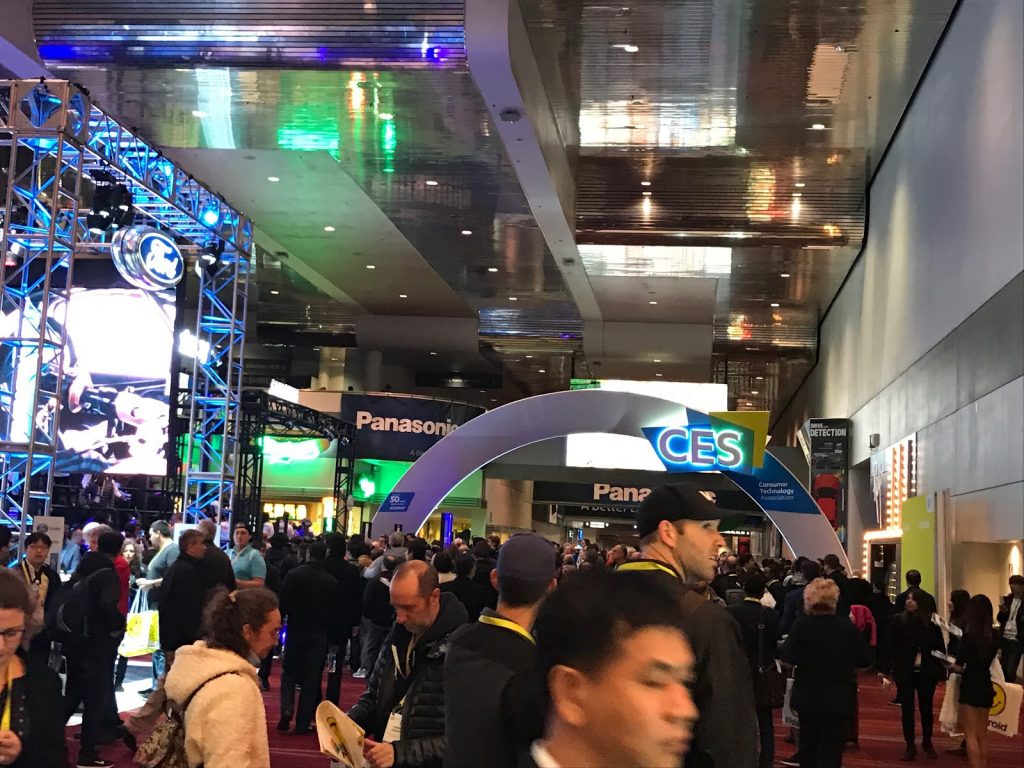For the last 15 years or so, I’ve been making the trek to the Consumer Electronics Show out in Las Vegas every winter. It’s where all the coolest next-generation gadgets and technologies are showcased.
I just got back from CES 2017 and I have to say it was one of the most exciting events I can remember. There were more than 177,000 people at last year’s event, and if I had to guess, I’d say we beat that number this year.
If you’ve never been to CES before, let me try to paint a picture. Events are scattered all across the city. But no matter where you wind up, the geeks hang out in the back showcasing their wares in small booths while the brand-name companies (e.g., Samsung and Sony) set up shop up front in larger booths.
That being the case, it appears the Internet of Things has finally become mainstream. This year, the IoT booths moved from the back of the room to the front of the room while VR and AR technologies were all over the back booths this year. We can expect these nascent technologies to make it to the front over the next few years as they develop further.
CES continues to attract more and more folks from around the globe. This year, there were more foreign entrepreneurs, investors, and professionals at CES — from China and Japan in particular.
There were also a number of other themes I picked on over the four-day event.
Smaller Companies Turned Out
At an event as large as CES, you obviously expect to run into the Amazons, Nikons, and Sonys of the world. (e.g.Nikon Project Helix)
They’re still there. But nowadays, the smaller booths are filled up by companies located all across the world. This year, companies from (not surprisingly) China and (surprisingly) Paris appeared to have spent the much money to showcase at CES.
Having all of these smaller companies with cool little products is great. It’s not every day that you’re able to check out an ozone ionizer that you can stick in your shoe to get the smell out. Or take a 3-D body scan and get a five inch 3-D printed version of yourself.
Fifteen years ago, that kind of product wouldn’t have a chance at CES. Today, they’re everywhere. What is more important is that they are not even in production yet, just a small batch run and now taking pre-orders or publicizing their Kickstarter. This wasn’t possible, even five years ago.
Car Manufacturers Prefer CES
The future of the car seems to hinge on technology.
Cars were everywhere at CES this year. There were connected cars and autonomous vehicles. Car manufacturers appear much more interested in releasing cars at CES instead of at the standard auto shows. They’re not going to the Detroit Auto Show to launch a new line; they’re coming to Vegas and doing that at CES.
All of the big name manufacturers — like Ford, BMW, GM, and Volkswagen — made the trek to CES. Of course Faraday was there, but more importantly, they took 64,000 pre-orders at CES for their $200k that is only in the concept phase. Even compared to last year, it was very apparent that technology is taking over the automobile industry.
The IoT Was Really Everywhere
At CES events in the past, IoT booths were all about mesh networks and sensors. Today, we’re seeing sensors in consumer products.
Everything is connected. There was even a connected hairbrush, which is the epitome of an unnecessary connected device. Still, products like that are great because in the coming years, the market will push out unnecessary devices. It’s just a simple issue of supply and demand.
Samsung — which has successfully shaken off its Note 7 debacle — was all the rage at CES. They built an entire connected kitchen which was completely mobbed. Everything was connected to the point we literally thought everything was connected. Unfortunately, the sink wasn’t connected — which we were kind of bummed about. It is silly. But if everything else is connected. . .
Thank You, Alexa
Alexa was truly everywhere, too.
Amazon opened up its API, and have manufacturers very obviously jumped all over it already. It bears repeating: Alexa was everywhere. Amazon even found a way to partner with physical buildings and futuristic robots.
Amazon made a huge investment in Alexa, which has already found a home in a number of IoT applications. In essence, Alexa is now the interface for all IoT devices that connects everything together. Who knows what the future will hold?
Looking Forward: CES 2018
Drones are becoming increasingly popular, but it’s relatively still “geeky”. I suspect we’ll see more mainstream drones at CES next year.
There are so many startups working on AI, AR, and VR. I am expecting to pursue an enormous selection of small batch manufacturers working with these technologies in 2018.
See you in Vegas next year!
